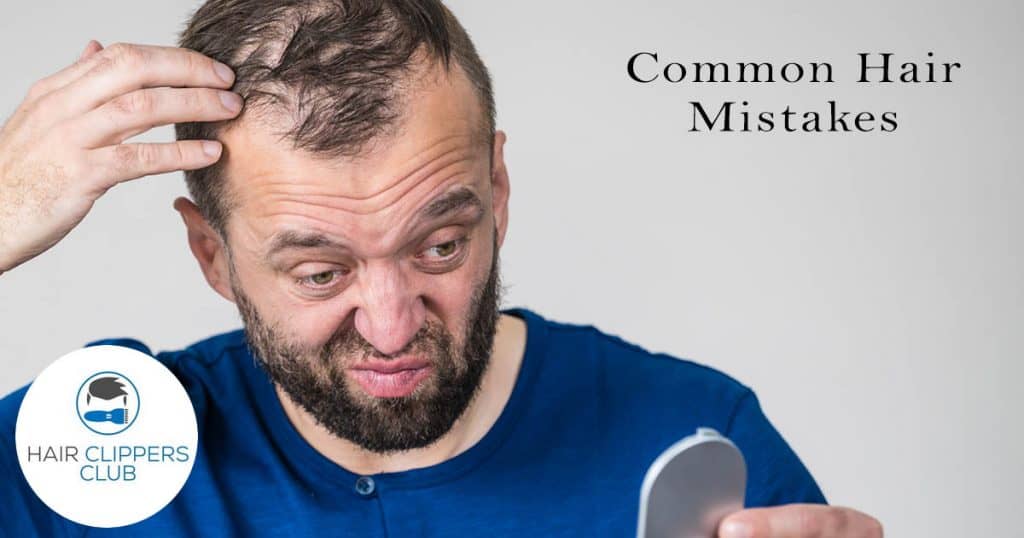Finding your style can be a complicated endeavor. Sometimes we look to replicate a celebrity’s hairstyle, but we don’t think about essential factors affecting our overall appearance.

Maybe you fancy a shorter hairstyle or like keeping your hair longer in the back. Aside from preference, you need to decide if a style is possible. This is based on things out of your control as well, such as density and hair type. Nonetheless, everyone has made at least a few hair-related mistakes in the past. And if you haven’t, this will better prepare you if you do.
Overusing Product
So, you are looking to start your day off clean? You use shampoo and conditioner and spray your hair for shine and fullness. Then, apply a clump of pomade to keep your hair straight all day long. Whatever you do, slow down and remember not to make this mistake again.
We understand hair products are meant to provide nutrients to the scalp and hair shaft. Additionally, the best products promote long-lasting health benefits like damage prevention and scalp strengthening.
With these advantages, there aren’t many reasons not to use hair products more. While true, using too many products or too much of one can lead to certain issues. For instance, excess pomade will add heaviness to your hair. Or, it will change the appearance of your hair, making it look much oilier.
This is one of the easier mistakes you can fix quickly. Simply stop using large amounts of a product. This will leave your hair healthy and you happy, ready to start your day off right.
Washing Your Hair Too Much or Too Little
In the shower, it is recommended to wash our hair with shampoo regularly. Shampoo should not be frowned upon, as specific types can potentially reduce the effects of scalp and hair issues.
Most companies today sell variations of the same shampoo or different shampoos made with a specific purpose in mind. Anti-dandruff shampoo is a godsend for men and women suffering from dandruff. It serves ingredients directly to the scalp, providing immediate relief to the areas with the most dandruff. Ask yourself: do you wash your hair too little or too much?
Over-washing isn’t the worst thing you can do, but it’s also not advised. Basically, after a certain amount of shampoo, you aren’t benefiting anymore. You are effectively killing the oil in your hair for no reason.
Not washing enough leads to a dirty scalp and split ends. Further, your hair will begin to break down since you are leaving out the source of nourishment. Sure, healthy foods aid in your overall hair health, but not washing diminishes the hard work you put into eating right.
Washing your hair on a schedule is the best way to know if you’re washing too little or too much. Choose your washing days and stick with them. If you find your hair is too dry, try washing more if with a different shampoo.
Ignoring Your Scalp
One of the worst mistakes you could make is forgetting about your scalp because it surely needs love. Taking care of your scalp is a vital process, so be sure to follow through.
Proper scalp care consists of maintaining a washing/conditioning schedule and rubbing products into your scalp that promote healing and provide nutrients. Finally, do not forget to choose products made for you.
Many individuals struggle with scalp conditions, like their hair being too dry or producing an excess amount of oil. Brands sell specific shampoos designed to dry out your scalp. Other shampoos work hard to fight dry scalp, with the ingredient jojoba, for instance. Jojoba oil is a natural, safe moisturizer. Anti-inflammatory ingredients in jojoba oil make it a great candidate for reducing dry scalp.
Again, a quick fix for this problem is to remember that your scalp is just as important as your hair. If you treat your scalp well, the hair attached to it will flourish.
Not Using Conditioner
Similar to shampoo, conditioners help improve the health of your hair and scalp. However, conditioners do something your shampoo can’t: they soften your hair and have several added benefits.
After you shampoo, you may find your hair to be more brittle. This is mostly due to the harshness of shampoo and the fact that shampoo cleans off your previously applied hair products as well as dead skin cells. Conditioner not only reverses your brittle hair, making it softer, but it allows you to style your hair with clay, pomade, gel, etc.
Further, conditioners prevent damage to your hair. The ingredients in conditioners include water, emollients, preservatives, humectants, and natural oils.
Water is a great all-around substance, loosening your hair and providing nutrients. Emollients are found in skin products, like skin creams and moisturizers, and help lessen the effects of skin conditions. Preservatives are used in foods mostly, but it’s a great antimicrobial substance in hair products. Aloe vera is derived from a plant and is a vital healing ingredient in conditioners. Lastly, conditioners have natural oils (bergamot and coconut) which soothe your scalp and help your hair grow.
When you don’t condition, your hair will be more brittle, you won’t be able to style it, and you are missing out on a handful of benefits. Start using conditioner after you shampoo, and your hair will thank you.
Washing Your Hair under Hot Water
We should always use shampoo to wash our hair. Some of us use shampoo more than others, but you cannot deny the benefits of washing your hair with a good shampoo. Washing your hair removes dirt, sweat, and pollutants.
What is the best water temperature for our hair? We know that showering with very hot water is terrible for our physical and mental health, and the only added benefit is cleanliness. Therefore, it would only make sense to use warm water when washing our scalp.
The cons of washing your hair in hot water are plentiful. Hot water acts as a second shampoo. Shampoo strips your hair of its natural oils, and washing under hot water strips your hair one more time. Don’t subject your hair to unnecessary temperatures when you can easily lower the temp.
I’m an outdoor enthusiast and have sported a full beard since I was in my early 20’s. Originally, growing a beard was a way to save time when getting ready each day, but I quickly realized that keeping a neatly trimmed beard takes work and some forethought. That’s where this site comes in.
You get to benefit from my years of experience. I’ve reviewed many of the top hair clippers on the market today and also included some information on what works best for me. A great beard will turn lots of heads in your direction.
Since I never know when I’m going to find myself being photographed, whether it’s climbing in Yosemite, or playing volleyball on the beach, it’s important to me to always look my very best. Maintaining my beard is part of my daily routine and I hope you’ll find some useful tips and information on this site to help you on your journey.
